Is getting a college degree worth it? That question hangs over millions of would-be students as they prepare to apply to university.
Once taken for granted by most people, the debate around the value of a college degree has steadily intensified. It’s been the source of several news articles and dinner table discussions.
Earning a college degree has traditionally been an important milestone in one’s professional life, so much so that it has become a central part of the “American Dream:” go to college, get a job, buy a house, and raise a family.
While professional success is not always that simple, in most cases, it starts with a college education.
Earning a college degree is all about opening opportunities in life. It prepares you intellectually and socially for your career and your adult life. Its benefits include better career opportunities, higher-paying jobs, and better skills.
Studies have shown that college education also leads to happiness and stability.
Most students know they want to attend college but don’t exactly know why or how it will enrich their lives. This article dwells into some of the many benefits of earning a college degree:
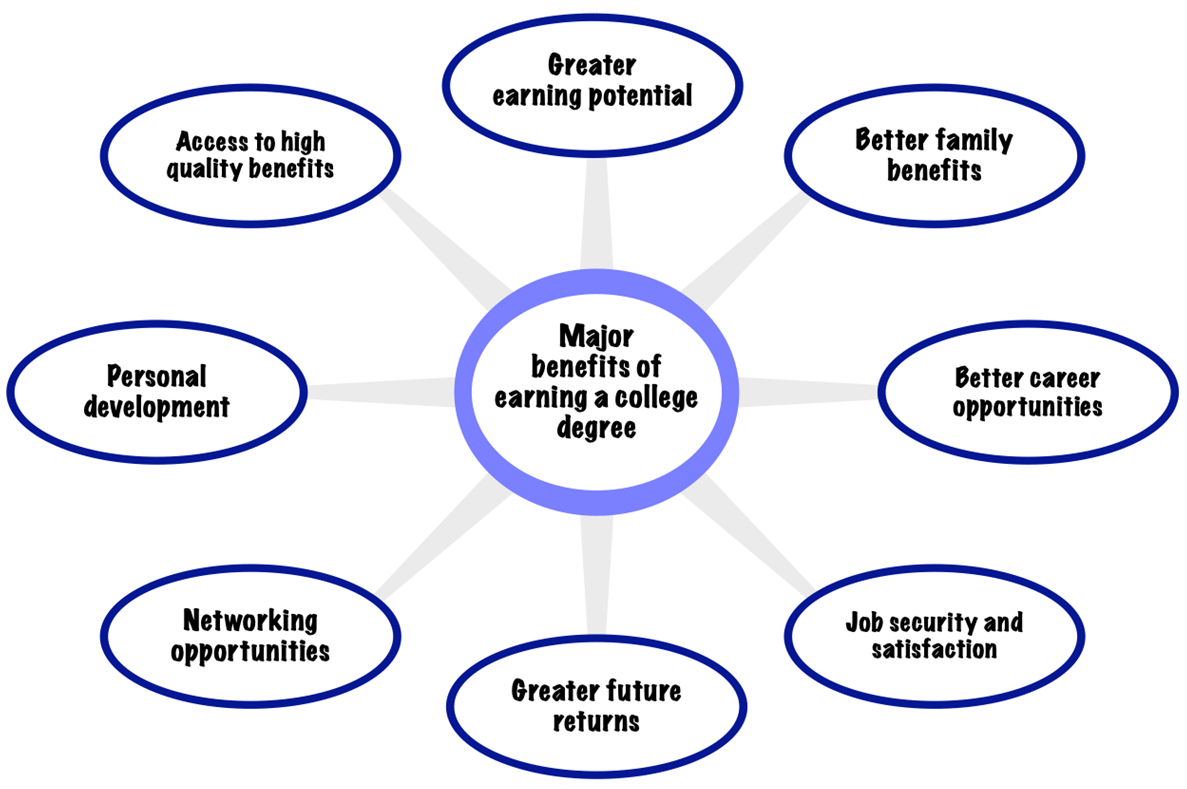
1. Make More Money
The wage premium accompanying a college degree has long been a driving force for higher education. A post-secondary degree, such as a bachelor’s, master’s, or PhD, is the most common route to high-paying careers that require advanced skills:
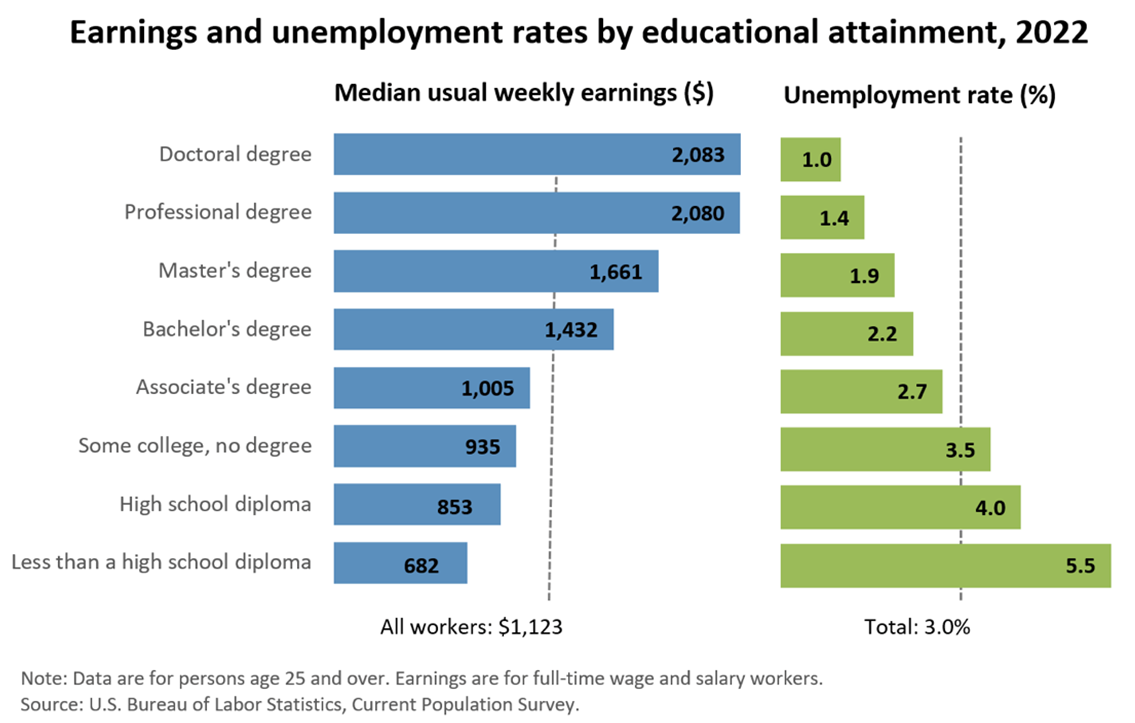
Studies show that college graduates earn significantly more money throughout their lifetime than those with only a high school education. The likelihood of unemployment also drops drastically with education level (see chart above).
A median college graduate makes a total of $2.8 million (70% more) throughout their career, compared to $1.6 million earned by their high school graduate peers, according to a 2021 study by Georgetown University’s McCourt School of Public Policy.
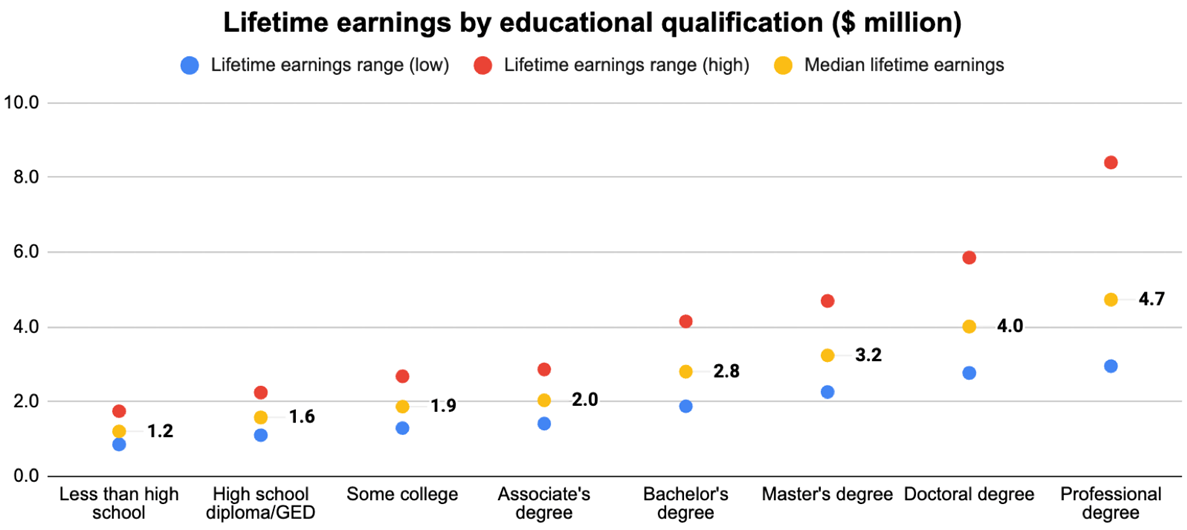
Earnings potential also varies depending on the field in which you work.
For example, a master’s degree in education or nursing will not yield nearly as much earnings as a master’s degree in engineering or business.
However, they are by far the most in-demand professions. If you choose to enter these professions, you will most likely find a good job, even though the pay may not compare well with a job in engineering or business.
Income disparity can also be influenced by gender and race. In 2022, American women typically earned 82 cents for every dollar earned by men, while black people earned 76 cents for every dollar earned by whites. However, a college degree significantly boosts earning potential despite such negative influences.
2. Benefits for You and Your Family
While higher-paying jobs are a primary benefit of earning a college degree, these jobs also tend to provide excellent benefits such as employer-covered healthcare, life insurance, pension and retirement plans, paid time off, and more.
Some of these benefits are rarely offered for jobs that demand only high-school-level education.
The higher your education, the more likely you are to work in a more critical role. This means your employer will invest in your continuous professional development and learning, which, in a way, is a long-term benefit of a good college degree.
Benefits such as healthcare offer your family stability and security and significantly lower your financial burden. For example, a family healthcare plan in the U.S. cost $23,968 in 2023, representing an average premium increase of 7%. This premium has increased 22% since 2018 and 47% since 2013.
The value of such benefits adds up significantly over time and may even exceed an employee’s take-home pay in the long run.
The benefits of a college education also tend to extend beyond a generation. Because the families of college graduates are generally better off economically and socially, they are more likely to send the next generation to college, thus reinforcing the cycle.
So, your college degree is, in a way, an investment in your family’s future.
3. Better Career Opportunities
A college degree is the most common pathway to a better career. While most desire a job that pays well and is satisfying and secure, not everyone knows what career path to choose when entering college.
Often, what matters is not what you study but whether you study. Aside from training you in an expert field, a college trains you to think analytically, understand complex subjects, and communicate your critical ideas.
This is why so many invest time and money into a college degree.
A meta-analysis that synthesized years of research on critical thinking showed that students make substantial gains in critical thinking during college. College education also instills crucial skills like organization, self-discipline, and an ability to take on complex tasks.
In other words, college helps mold you into a more professional individual.
Because college provides a broad range of skills, many graduates end up in fields they may not have studied (or been aware of) during school. Thus, college can open unexpected opportunities that may not be available for those not exposed to a higher level of education.
In today’s competitive economy, employment options for people with only a high school diploma are shrinking, while the trend of unemployment rate has traditionally been higher:
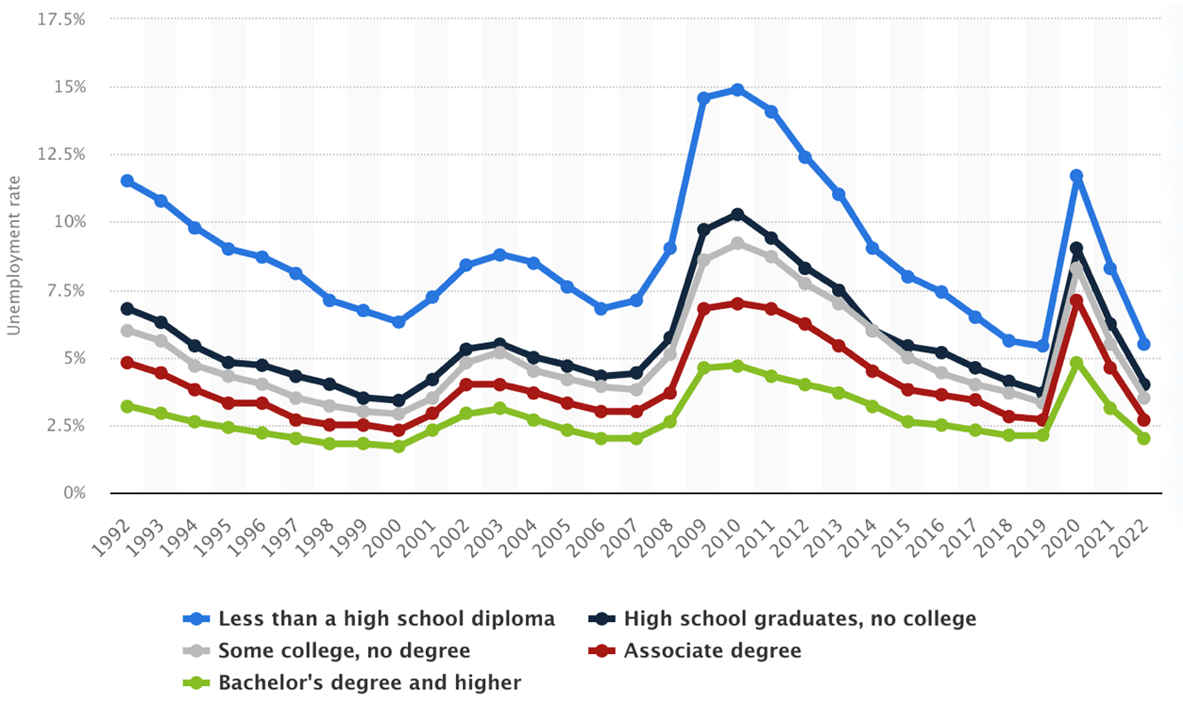
The vast majority of this group work in the service industry, in low-paying jobs that offer few opportunities for advancement. College graduates, on the other hand, tend to have skills that qualify them for a broad range of employment in fields that offer more upward mobility.
4. Job Security and Satisfaction
Let’s face it: you’re less valuable to your employer without a degree. It is easier to find your replacement when all one needs is a high school education versus looking for someone with an advanced degree.
Another, more pressing, reason for this vulnerability is the increasing use of automation. According to a McKinsey report, low-end jobs are most likely to be eliminated by generative AI by 2030, and some of these jobs are up to 14 times more vulnerable.
However, the same report predicts a growth in demand for jobs requiring higher education and skills while a decline in roles that typically do not require college degrees:
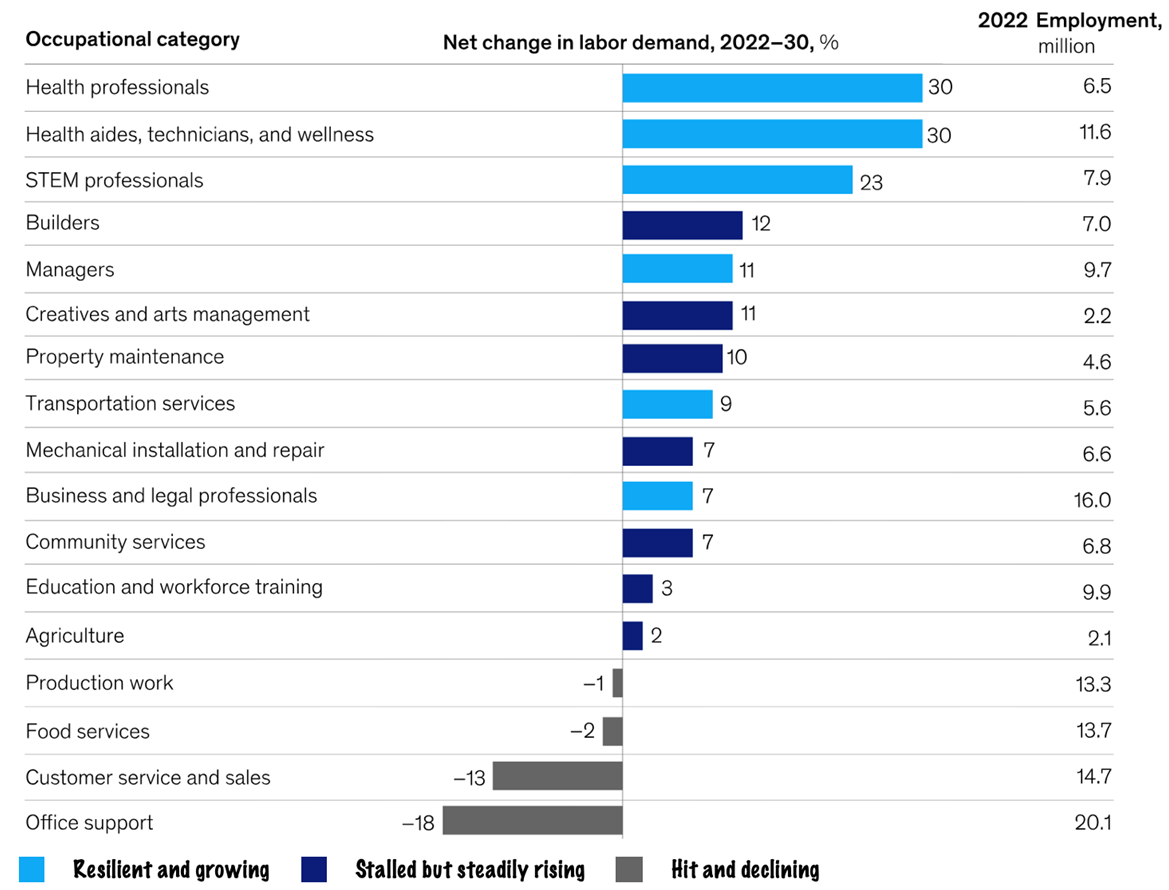
For this reason, a college degree typically leads to better job security.
In fact, some companies value an educated employee so much that they even pay for the tuition. College education is seen as an investment that brings substantial rewards, not only to the employee but also to the company.
Additionally, data shows that college graduates are less vulnerable to layoffs during an economic recession, while lower-level employees with only high school diplomas suffer the most. While this does not guarantee job security, a college degree makes you less likely to suffer long-term unemployment.
Also, as a college graduate, you are more likely to enjoy your job. All the factors listed above—higher income, employment benefits, and advancement opportunities—contribute to better job satisfaction.
A report titled “Education for What?” by Gallup shows that higher education is linked to increased life satisfaction and better health:
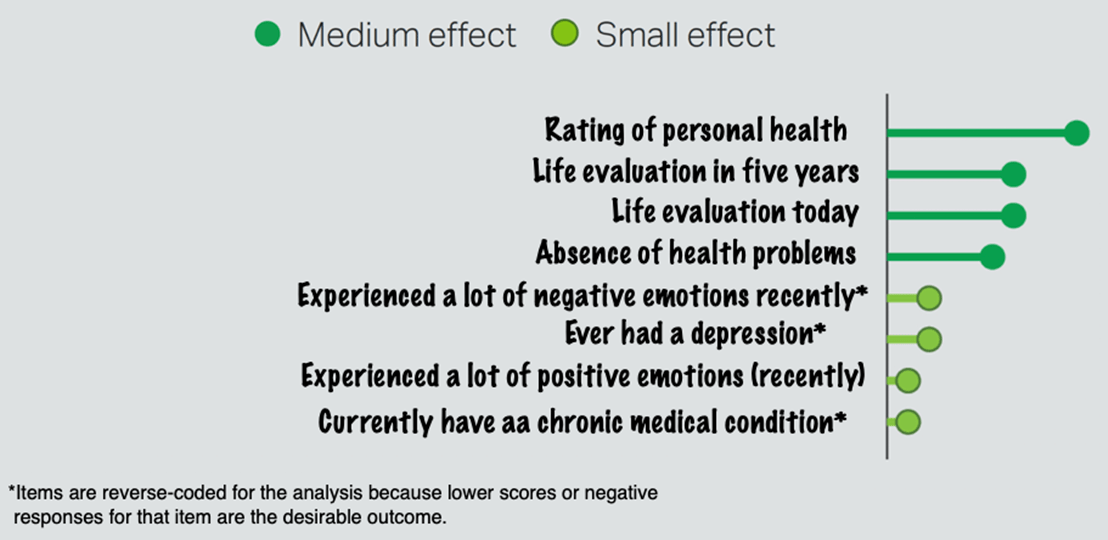
A college degree also gives you more freedom to pursue a career that interests and inspires you.
5. An Investment in Your Future
Earning a college degree requires a major commitment of time and money, but, in a way, it is a down payment for your long-term success.
A college degree will help you realize your goals in your career and life in general. Looking back, all that hard work will seem worth it because it will prepare you for a challenging and rewarding career and a more fruitful life.
As Benjamin Franklin insightfully remarked, “If one empties their purse into their head, no one can take it away from them. An investment in knowledge always pays the best interest.”
6. Networking Opportunities
While great future earnings, a satisfying job, and a rewarding career are commonly expected outcomes of a college degree, the role networking plays in each of them is less spoken of. The connections you make in college can be just as valuable as the skills and knowledge you acquire.
People often secure great jobs based on recommendations made by friends or learn about great opportunities from their professional networks. Studies have found that 85% of all positions are filled via networking, and 80% of all open positions are never advertised but instead found through personal connections.
The foundations of such networks begin to form in college.
A college can provide ample networking opportunities. Plenty of volunteer organizations, events, clubs, and meet-up opportunities can help you connect with others in your field and learn about job opportunities.
The contacts you develop in college may be able to link you to resources such as books and case studies or even connect you with established professionals, which can help you learn more about the industry you hope to enter.
Another beneficial aspect of networking is the opportunity to establish connections with professionals who may recommend you for a job. For example, an internship during college may connect you with a manager who may later recommend hiring you.
It is quite common for companies to consider internal candidates before looking elsewhere for potential hires. Consequently, your professional contacts can recommend you when businesses begin hiring, giving you an edge in being selected for a job in your field.
Here are a few actions you can take to maximize networking opportunities when in college:
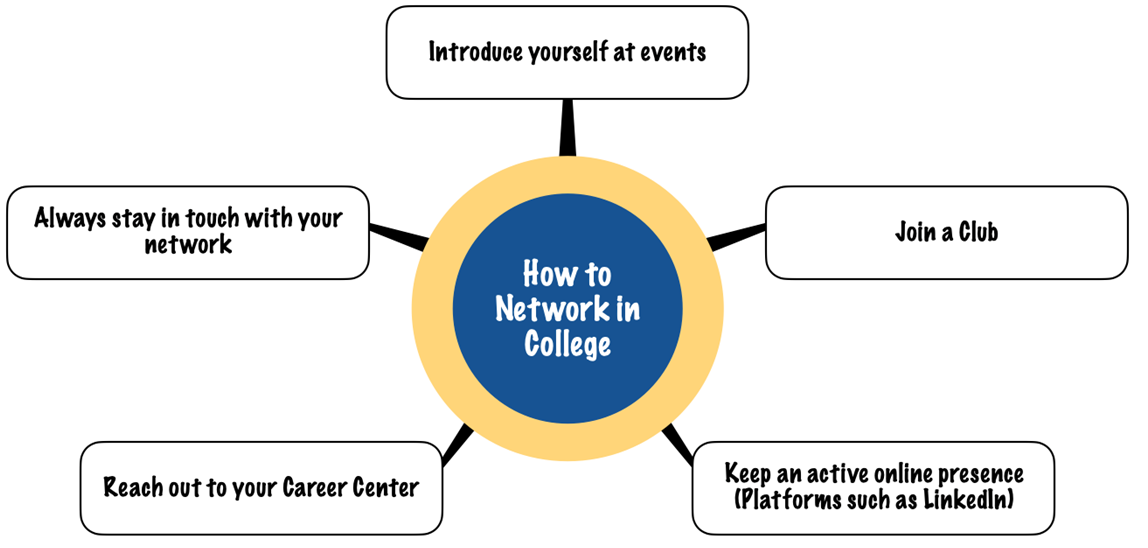
7. Personal Development
Earning a degree requires dedication and hard work. You will encounter difficulties and obstacles that demand perseverance, discipline, and commitment throughout the process.
Overcoming them will improve your personal skills and prepare you for many of life’s challenges. Time management and organization are just two examples of the skills you’ll acquire during college. Both are needed to navigate the many courses you’ll be taking and tackle the tasks ahead.
For instance, completing a college curriculum requires you to take multiple tests, quizzes, and course assignments while managing tight deadlines. Dealing with multiple classes can become confusing without proper time management and organization.
This will force you to develop these much-needed skills to manage your responsibilities, not only in college but also in your professional and personal life.
On a larger level, the personal development you’ll experience will primarily be related to overcoming adversity. College requires that you overcome one challenge after another, ranging from financial responsibilities to tests to completing projects.
In order to complete your college, you’ll need to be intelligent and disciplined. These traits are often developed slowly throughout college. As you learn how to better respond to stress and adversity, you’ll slowly find that you’re better able to deal with adversity in a number of situations.
8. Access To High-Quality Benefits
When economic conditions are good, most businesses look to hire and expand. Consequently, companies find attracting top talent extremely hard in such a market, which gives highly qualified employees an advantage.
If you are qualified, you get to pick and choose your potential employer and your next job. You will be better positioned to negotiate and refuse an offer from one company in favor of the other.
A college degree gives you that power and puts you in high demand. Businesses often try to lure such employees with incentives that go beyond just good pay. Some of these benefits include:
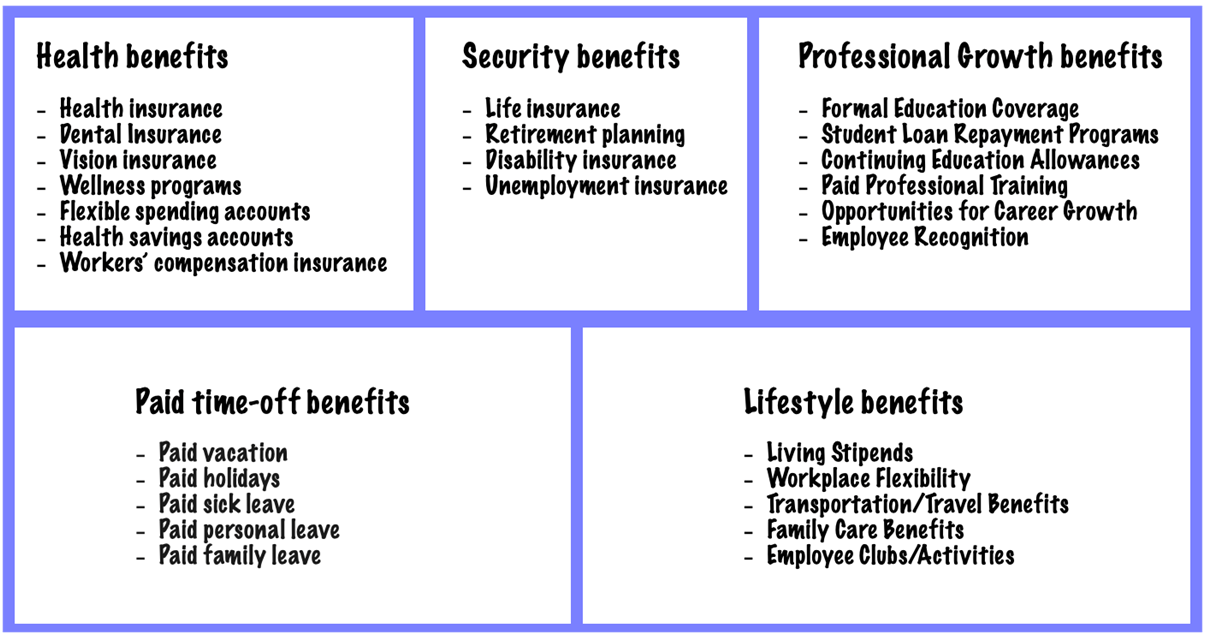
Your college degree gives you access to high-quality benefits and perks that not only increase your quality of life (e.g., flexible work) but also significantly reduce your financial burden (e.g., retirement planning, more comprehensive insurance).
You will have more resources to invest time in activities you enjoy – such as traveling or a hobby and live a more fulfilling life.
Choosing a College Major
A degree in art might not lead to a career with a six-figure salary, but where would society be if everyone became an engineer? We need artists too, don’t we? So, does it matter what college major you pursue?
Well, a lot of people didn’t think so until recently.
Due to falling post-graduate employment numbers and the rising cost of tuition, many are beginning to rethink the value of certain majors and degree programs. Several studies show which majors provide a decent return on investment and which don’t.
Not surprisingly, a major in STEM (Science, Technology, Engineering, and Math) is the preferred choice because it helps find jobs quicker, the earnings are higher, and experience in these fields brings better job stability compared to degrees in, say, liberal arts or humanities fields.
This becomes particularly important when the job market is tough, such as periods of economic downturn or a recession. Fresh graduates with degrees in social sciences, humanities, or liberal arts can find it very challenging to find gainful employment.
Recent engineering, mathematics, and computer science graduates demanded some of the highest starting salaries ($100,000+):
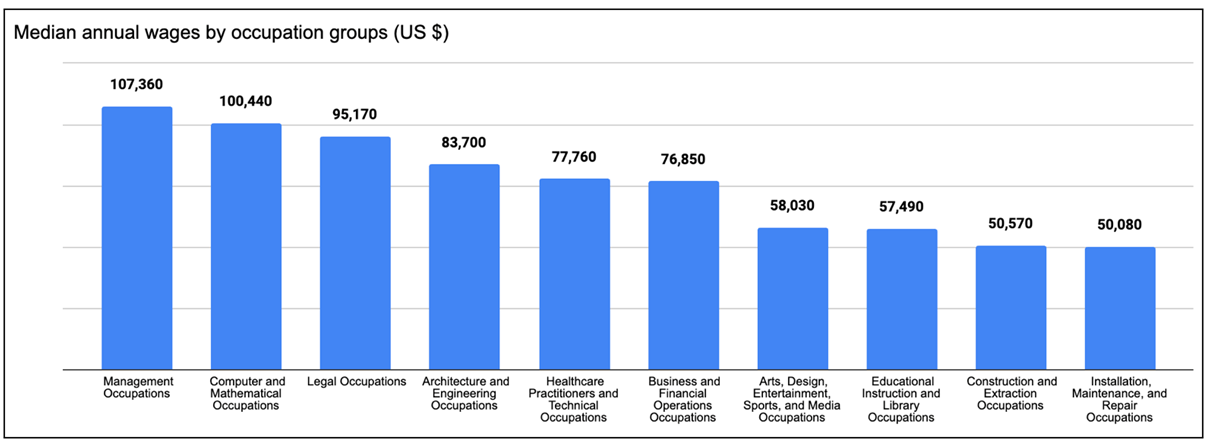
However, choosing a college degree is not just about money. Many students interested in degrees in social sciences, humanities, or liberal arts look for personal rewards that are not (only) financial in nature.
And forcing people into a major, such as computer science, simply because it yields a relatively high financial return on investment may create shortages in occupations that are just as important to a country’s economic future.
Not all degrees are equal. But you may be surprised to find how valuable different degrees are. A ranking list compiled by Stacker based on data from the Census Bureau’s American Community Survey shows that chemistry, finance, education, and nursing are majors with some of the lowest unemployment rates.
So, how does one decide what stream to choose?
While the straightforward answer is to choose a field with the highest earning potential, some argue that the answer isn’t so simple. Finding something that combines your passion with the skills the world needs is essential.
Here are a few tips that may help you decide what field to choose for your college:
- What are your feelings telling you? – think about the kind of work you’re doing now or what you plan to do. Brainstorm and jot down ideas of different careers you’re considering. What feelings come up?
- What matters to you? – take a psychological assessment or complete an exercise to help you identify your values. Understanding your values will allow you to make choices that align directly with what you care about.
- What matters to other people/society? Just as it’s essential to be clear about what matters to you, it’s also important to consider how your decision will impact the people around you and society. Ask for thoughts, input, and feelings.
- What is the reality of the situation? – be objective and consider the realities surrounding your options, not your assumptions. Otherwise, you might have false expectations or feel disappointed by your choices.
- How do I put the pieces together? Once you’ve answered these four questions, review all the information you’ve discovered before you come to the final decision. If you don’t, then revisit the previous steps.
Proponents of non-STEM majors argue that a good liberal arts education develops well-rounded students who can succeed in any number of jobs. Proponents of STEM majors point out that many students opt for liberal arts majors because they are not as difficult and require less work to get good grades.
However, all agree that acquiring leadership, communication, analytical, and problem-solving skills in college is what’s most important to future success—regardless of how it occurs.
Whichever educational path students pursue, one thing is clear: they must be better prepared to face an increasingly competitive job market and turn their college education into a winning proposition.

